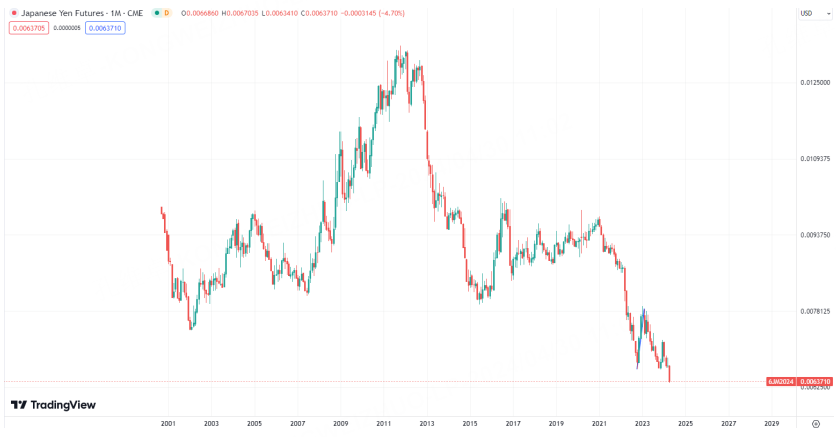Will the Yen Continue Sliding Further in 2024?
The foreign exchange market has been calm in the past few years.
The large shock mode of the the US Dollar Index has caused most currencies to trade in a range mode. However, there are also outliers among them. The yen continues to fall and set a new historical low, but it is still not intervened by the central bank. What is the reason behind allowing the yen to fall?
From the trend of the yen in CME group, it can be seen that the historic low has been moving down in the past few months, which also includes the macro environment where the Bank of Japan has begun to tighten.
Looking forward, the Bank of Japan also briefly intervened in the foreign exchange market in 2022-2023, but the intensity was relatively limited, and the yen also rebounded slightly before sinking again.
Obviously, from the Japanese authorities, the depreciation of the yen does not seem to be a big problem. On the one hand, the depreciation of the exchange rate under the export guidance will bring certain advantages, and although the cost of imports has increased, the losses in this regard can be offset by the rise in the Japanese stock market and property market. Therefore, from the actual situation, although the yen has almost fallen to the 160 level against the US dollar, inflationary pressures and other risks are not significant.
Secondly,As we all know, the yen is a financing currency with safe-haven attributes. This means that in a relatively stable market environment (for example, the U.S. stock market has been slowing down), when the yen cannot attract safe-haven buying or capital return, its continuous decline is also in line with its tonality. In part of 2023, there have been discussions about whether the renminbi will also have financing attributes, but the actual situation is that the renminbi has only entered a new trading range, but it does not have the conditions to become a financing currency. In an environment where both internal and external fundamentals are negative for the yen, the yen naturally cannot find a turnaround.
In addition, I personally think that one point worth thinking about may be the adjustment of the United States' approach to harvesting the global market. In the 1980s and 1990s, the United States used political and economic means to force the currencies of Southeast Asian countries and Latin American countries to spring (appreciate first and then depreciate) to harvest the economic achievements of other countries.
However, with the prospect of the times and the transparency of information, this simple and crude gameplay is no longer effective. The plan chosen by most countries is also very direct: instead of being harvested twice, I might as well lie flat, and I will not actively protect the exchange rate. Therefore, now the United States seems to be developing a new way of playing, which is no longer to directly collect the country's wool, but to harvest global investors in an all-round way.
This has to mention our so-called troika again: US stocks and gold represented by Bitcoin, Nvidia. By creating a money-making effect, these three have become the money-making machines that the majority of investors agree on. So, what if, after the "money absorption" is enough, the early entrants or controllers start to sell, what will happen? Obviously, the inherent model will prevent most people from choosing to cut their flesh at the first time, and what will follow is that they will get deeper and deeper and cannot stop losses, and finally achieve the goal of the United States. Of course, all this will not come immediately. There is still a process from accumulation to release. At least before the general election, there is still not much risk. But when all the benefits are realized, we still need to be vigilant against variables.
$NQ100 Index Main 2406 (NQmain) $$Dow Jones Main 2406 (YMmain) $$Gold Main Company 2406 (GCmain) $$WTI Crude Oil Main Company 2406 (CLmain) $$SP500 Index Main 2406 (ESmain) $
Disclaimer: Investing carries risk. This is not financial advice. The above content should not be regarded as an offer, recommendation, or solicitation on acquiring or disposing of any financial products, any associated discussions, comments, or posts by author or other users should not be considered as such either. It is solely for general information purpose only, which does not consider your own investment objectives, financial situations or needs. TTM assumes no responsibility or warranty for the accuracy and completeness of the information, investors should do their own research and may seek professional advice before investing.
- wimpy·2024-04-30The market could spiral downward.LikeReport

